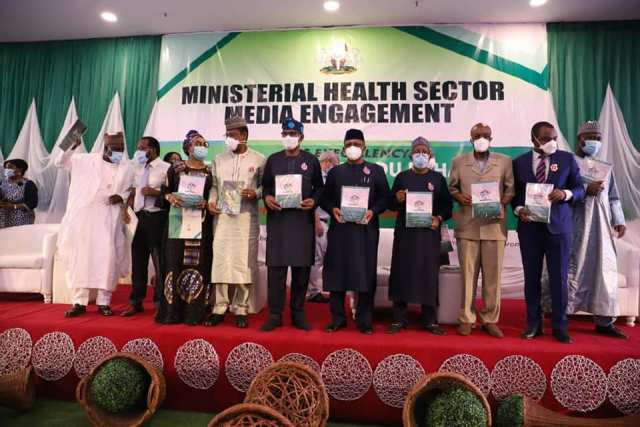 Nigeria's Federal Ministry of Health held a media engagement event in December 2020. [photo: Federal Ministry of Health on Facebook]
Nigeria's Federal Ministry of Health held a media engagement event in December 2020. [photo: Federal Ministry of Health on Facebook]
[This is an excerpt from an article in The Round Table: The Commonwealth Journal of International Affairs. Opinions expressed do not reflect the position of the editorial board.]
The COVID-19-related scepticism among Nigerians started gradually when, in the absence of globally agreed medications, people were initially quarantined and later released with a clean bill of health. However, the scepticism reached a crescendo as new mutated variants of COVID-19 virus were reported across the world, especially in the UK, US, Japan, and South Africa. The scepticism in Nigeria is fuelled by a combination of factors. The first factor is the elitist manifestation of the coronavirus disease in terms of its transmission trajectory, health complications and fatality. Almost all the known casualties of COVID-19 in Nigeria were members of the elite. Anecdotal evidence indicated that people without a history of overseas travels who thought they had the benchmark symptoms of COVID-19 and contacted officials of NCDC were promptly dismissed and advised to take antimalarials.
The second factor is the overall low rate of fatality of COVID-19. In relation to confirmed cases, the fatality rate of COVID-19 in Nigeria was still a mere 1.26% as at 19 March 2021. This rate is incomparable to recorded case fatality rates of Ebola haemorrhagic fever (EHF), malaria or yellow fever. Added to this is the perception-reality disconnect in terms of people not being able to identify any of their kith and kin among those confirmed to have been affected by COVID-19.
The third factor that underpins public scepticism is the politicisation of COVID-19 and the massive corruption associated with the management of its palliatives. The masses see the various publicity outputs on COVID-19 as a hype designed by the elite to provide a prima facie means of looting state resources. In the first four months following the COVID-19 outbreak (April–July 2020) the Nigerian government spent about N30.54 billion (US$85 million) without any identifiable impact on livelihood expectations. Additionally, most of the politicians who received COVID-19 palliatives for disbursement to their constituents never distributed them.
The fourth factor is the disconnect between the predictions of COVID-19 holocaust in Nigeria and the reality on ground. Notwithstanding the country’s healthcare system that is near comatose, the number of confirmed cases and fatalities has not spiked uncontrollably as variously predicted by experts. Even after several days of #EndSARS protests in which hundreds of thousands of youths actively participated to protest police brutality, no unusual spike in the number of confirmed cases was recorded, even in the absence of serious precautionary measures.
The fifth factor is general disenchantment with governance in the face of deepening poverty. The recent data from Nigeria’s National Bureau of Statistics (NBS) indicated that 82.9 million Nigerians or 40.1% of the population live below its poverty line of N137,430 (US$381.75) a year. Considering the massive socio-economic dislocations caused by COVID-19 and the devaluation of the Nigerian currency, more people have undoubtedly slid below this poverty line than the NBS reported in May 2020.
The sixth and last factor that has emboldened indifference among the masses is the pervading influence of religion and faith in religious leaders. Many religious leaders in Nigeria have wittingly or unwittingly sown the seed of nonchalance to COVID-19 preventive protocols, especially in the face of testimonies about miraculous healing from COVID-19 afflictions. The emphasis on the supremacy of God in relation to all manner of afflictions and the availability of His divine protection appears to be contributory to emboldening the masses to adopt a dismissive attitude.
The immediate solution to the dismissive disposition of the Nigerian people to the COVID-19 pandemic is for government to upgrade its healthcare facilities and strengthen national capacity to deal with health challenges. What is required, therefore, is more investment in the health sector. The starting point is to drastically shore up the budgetary allocation of the health sector, which is abysmally low at under 5% of Nigeria’s national budget.
Agaptus Nwozora is a Senior Lecturer at the Department of Political Science and International Relations, Landmark University and Onjefu Okidua is a Senior Lecturer at the Department of Political Science and International Relations and a Senior Lecturer in the Mass Communication Programme, Landmark University, Nigeria.



